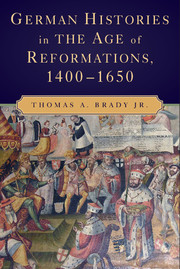Book contents
- Frontmatter
- Contents
- Figures, Maps, and Tables
- Acknowledgments
- A Note on Usages
- Map 1 The Empire in 1547
- Map 2 The Peace of Westphalia, 1648
- Part I The Empire, the German Lands, and Their Peoples
- Part II Reform of the Empire and the Church, 1400–1520
- 5 Reform of Empire and Church
- 6 The Empire and the Territorial States
- 7 The Reform of the Empire in the Age of Maximilian I
- 8 Ideals and Illusions of Reforming the Church
- Part III Church, Reformations, and Empire, 1520–1576
- Part IV Confessions, Empire, and War, 1576–1650
- Appendix
- Glossary
- Bibliography
- Index
6 - The Empire and the Territorial States
Published online by Cambridge University Press: 05 June 2012
- Frontmatter
- Contents
- Figures, Maps, and Tables
- Acknowledgments
- A Note on Usages
- Map 1 The Empire in 1547
- Map 2 The Peace of Westphalia, 1648
- Part I The Empire, the German Lands, and Their Peoples
- Part II Reform of the Empire and the Church, 1400–1520
- 5 Reform of Empire and Church
- 6 The Empire and the Territorial States
- 7 The Reform of the Empire in the Age of Maximilian I
- 8 Ideals and Illusions of Reforming the Church
- Part III Church, Reformations, and Empire, 1520–1576
- Part IV Confessions, Empire, and War, 1576–1650
- Appendix
- Glossary
- Bibliography
- Index
Summary
Whoever concludes that Germany's undertakings will be powerful and will always succeed does not consider that it suffices to block the emperor, when the princes do not support him in the execution of his plans. Those who do not dare to make war against him, deny him the troops; those who deny them also have the courage not to send them to him; and those who don't dare to deny them, dare to delay their sending so that they come too late to help him…. Germany's might is great, but is such that it cannot be used.
Niccolò MachiavelliFrederick III, the strange, eccentric man who came to the royal throne in 1440, would reign over the Holy Roman Empire for fifty-three years, longer than any other emperor. After him came Maximilian I (r. 1493–1519), his only son, who ruled for another twenty-six. Longevity and fecundity, Habsburg hallmarks, preserved the dynasty's reign over the Empire and its Austrian successor state for nearly 500 years. Had anyone predicted such a future at Frederick's accession, or at any other point in his long life, that person could today be considered certifiably mad.
There is truth behind Frederick's image as a monarch weighed down by isolation and lethargy, though he did not deserve the nickname of “the Empire's Arch-Sleeping Cap.” His isolation did not reflect ignorance about his realm, for no emperor in 250 years had better first-hand experience of the German lands.
- Type
- Chapter
- Information
- German Histories in the Age of Reformations, 1400–1650 , pp. 89 - 106Publisher: Cambridge University PressPrint publication year: 2009

